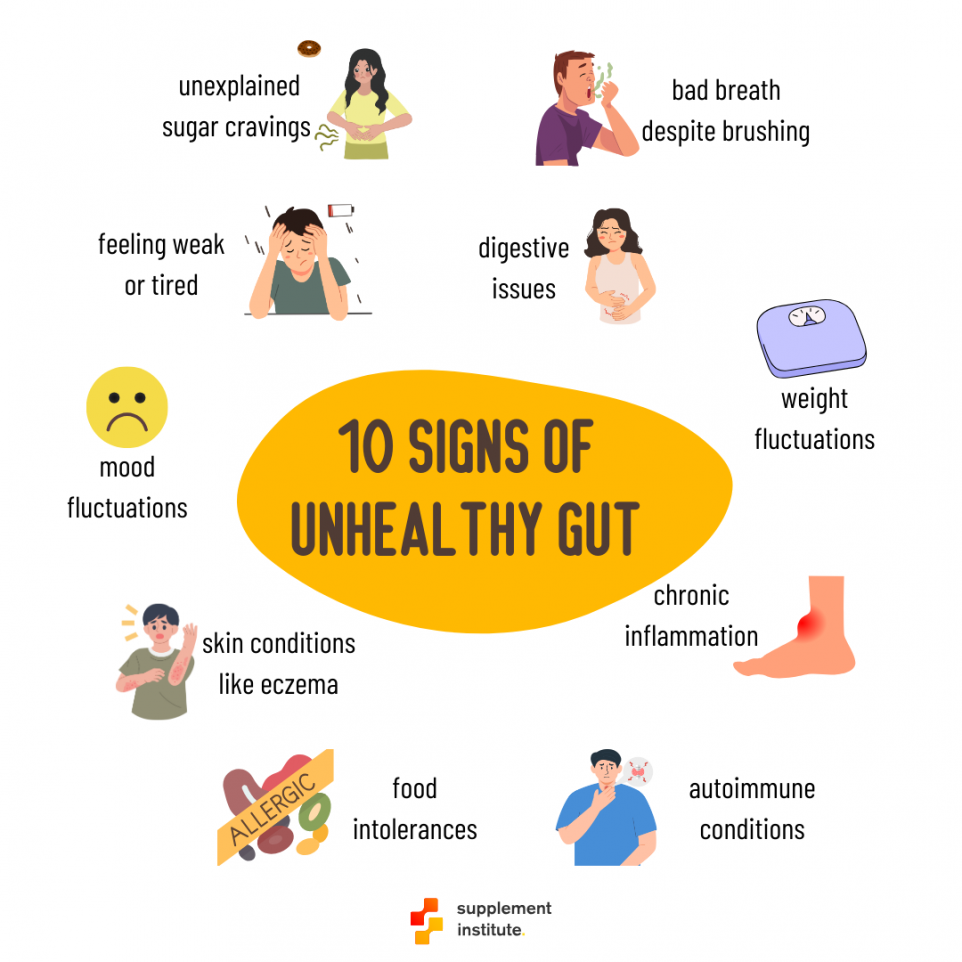10 Signs of an Unhealthy Gut and It’s Link to Anxiety

When we talk about gut health, we’re not just referring to bloating and stomach troubles. If you’ve been feeling off lately but can’t quite pinpoint what’s wrong, the trouble isn’t in your head—it’s in your gut. Your gut health can influence more than just your digestion. It plays an important role in your overall health, from mood swings to your immune system, and when things aren’t right down there, your body has its ways of waving a red flag, and sometimes the symptoms can manifest as stress and anxiety. Here are 10 signs of an unhealthy gut and how it might be affecting your mental well-being.
What Are Microbiota?
The human gut houses trillions of microbes, including bacteria, viruses, and fungi, collectively known as the microbiota. This community plays a crucial role in digestion and beyond. It affects your body’s vitamin and mineral absorbency, hormone regulation, digestion, vitamin production, immune response, and ability to eliminate toxins.
The microbiota also produces hundreds of neurochemicals that the brain uses to regulate physiological and mental processes such as learning, memory, and mood. For example, approximately 95% of the body’s supply of serotonin, a mood stabilizer, is produced by gut bacteria. Dysregulation in the gut’s microbiota can lead to significant issues in mental health, leading to conditions such as anxiety and depression.
The Connection Between Gut and Brain
The connection between your gut and your brain is more profound than you might think. It’s not just about feeling butterflies in your stomach or experiencing a “gut-wrenching” moment. The communication between your gut and brain is a complex, two-way street that fundamentally influences your overall health, mood, and even your decisions.
The gut-brain axis refers to the physical and chemical connections between your gastrointestinal tract and your brain. A key player in this relationship is the vagus nerve, one of the longest nerves in your body, which sends signals in both directions. For instance, when your brain perceives that you’re in danger, it sends stress signals through the vagus nerve to the gut, which can disrupt your digestive process. Conversely, a troubled intestine can send signals to the brain, leading to mood changes.
This bi-directional communication system involves various complex pathways including neural, hormonal, and immune responses. The enteric nervous system in the gut, often called the “second brain,” operates independently but is influenced by the brain. It helps manage everything from swallowing to the release of enzymes that break down food, to the control of blood flow that helps with nutrient absorption and elimination.
Stress and Gut Health
Recent research published in Nature Mental Health looked deeper into how our gut health significantly impacts our mental well-being through brain-gut microbiome (BGM) interactions. The study found that people with high mental resilience showed enhanced profiles of certain bacteria associated with stress resistance.
These bacteria play important roles in metabolic pathways that promote gut health and reduce inflammation. The study underscores the significance of the gut-brain dialogue—a two-way communication system mediated by neural, hormonal, and immunological signaling pathways. This system helps the brain understand and react to changes in gut microflora and vice versa. For example, certain gut bacteria can produce neurotransmitters like serotonin, which directly affects mood and emotional well-being.
The impact of stress on gut health is profound. Stress is inherently linked to conditions such as irritable bowel syndrome (IBS) by influencing gut motility and fluid secretion. Chronic stress can significantly impact the balance and diversity of the gut microbiome, leading to dysbiosis, which can contribute to a range of disorders.
Inflammation is another critical link between the gut and brain. Chronic, low-grade inflammation in the gut can lead to systemic inflammation, which is a risk factor for depression. The gut microbiota influences the body’s immune response, and a healthy gut contributes to a well-regulated immune system, which is less likely to go awry and impact the brain.
10 Signs of an Unhealthy Gut

Unexplained fatigue: Ever feel wiped out even after a full night’s sleep? That could be your gut crying out. A sluggish digestion can significantly sap your energy, leaving you feeling exhausted without an obvious cause.
Digestive distress: This is the classic sign. Gas, bloating, diarrhea, and constipation are not just minor annoyances. They are clear indicators that your digestive tract might be struggling with an imbalance, potentially due to poor bacterial health or yeast overgrowth.
Sugar cravings: Can’t walk past a donut shop without going in? Your gut bacteria might be to blame. An imbalance in your gut flora can increase cravings for sugar and refined carbs, feeding the bad bacteria and creating a vicious cycle.
Bad breath: Halitosis isn’t just embarrassing—it can also indicate that something’s amiss in your gut. While dental hygiene plays a role, persistent bad breath can also stem from deeper digestive issues, such as a malfunctioning stomach producing less acid than needed.
Mood fluctuations: Feeling moody or anxious might not just be in your head but in your gut. An unhealthy gut can impair your body’s ability to produce and regulate critical neurotransmitters like serotonin and dopamine, heavily impacting your mood.
Skin irritations: Skin conditions like eczema or acne might be reflections of your internal health, particularly your gut. Inflammatory responses caused by gut imbalances can manifest directly on your skin.
Autoimmune conditions: More and more research points to a link between the health of the gut and autoimmune diseases. An imbalanced gut may trigger the immune system to attack its own body tissues, leading to autoimmune disorders.
Food intolerances: Suddenly can’t handle foods you used to enjoy? It could be due to a damaged gut lining. This can lead to difficulties in digesting certain foods, increasing sensitivity and reactions.
Weight fluctuations: Struggling with unexplained weight changes? Look at your gut health. Imbalances can impair your body’s ability to absorb nutrients, regulate blood sugar, and store fat.
Chronic inflammation: If you’re constantly battling inflammation, it could be linked to a gut in distress. The gut is closely tied to the immune system—when your gut flora is out of whack, it can trigger chronic inflammation, leading to a host of other health issues.
How to Improve Your Gut Health
Improving your gut health begins with what you eat. Diets rich in fiber, prebiotics, and probiotics can foster a more diverse and robust microbiome, which in turn can enhance your mental health. Foods high in fiber, such as fruits, vegetables, and whole grains, feed the good bacteria in your gut. Fermented foods like yogurt, sauerkraut, and kefir contain beneficial bacteria that can improve the health of your microbiome. You can also take gut health supplements if you’re not able to get enough prebiotics and probiotics through your diet. You can consider more organic formulas as well, such as sea moss capsules, which have been shown to support gut health and improve digestion.
Regular exercise, adequate sleep, and stress management are also crucial for maintaining gut health. Physical activity increases gut motility and diversity, which improves overall gut health. A good sleep routine helps regulate the hormones that affect gut motility while managing stress through techniques such as mindfulness or yoga can reduce the impact of stress hormones on gut function.
Building a Stronger You
Supplement Institute is the fruit of extensive online publishing experience, spanning the breadth of SEO strategies to the nuances of paid advertisements. Our journey, marked by significant achievements and learning moments, inspires our core mission: to empower our readers with an abundance of information. By sharing insights and key learnings, we aim to provide you with the knowledge needed to navigate the complex world of supplements, helping you make well-informed decisions for your health and well-being. Welcome to Supplement Institute, where information is your greatest supplement.
